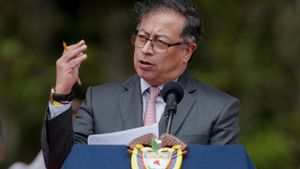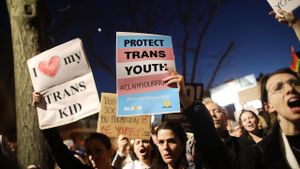On February 1, 2025, President Donald Trump reiterated his controversial plan to relocate Palestinian refugees from the Gaza Strip, asserting emphatically, "They will do it. They will do it. They’re going to do it, okay? We do a lot for them, and they’re going to do it." Trump made these remarks during discussions aboard Air Force One, where he expressed his desire for Egypt and Jordan to accept those displaced by the protracted conflict with Hamas.
Referring to Gaza as "literally a demolition site now," Trump is seeking to explore avenues for peace by uprooting over 1.5 million people amid the devastation caused by the intense bombardment during Israel's military campaign. This initiative follows the ceasefire agreement reached on January 19, 2025, which has seen the release of numerous hostages and some clarity around humanitarian efforts.
Despite Trump's insistence, both Egypt and Jordan have vocally rejected the notion of resettling Palestinians within their borders. The situation escalated dramatically with large protests erupting at the Rafah border crossing, where demonstrators crowded with signs declaring sentiments like "Egypt is a red line! No to displacement!". The sentiment echoes widespread disapproval not only from the local populace but also from various international fronts.
During his press statements, Trump detailed his personal communications with leaders of the neighboring countries. He revealed having spoken to Jordan's King Abdullah II, expressing optimism about the plan. Trump emphasized, "You’re talking about a million and a half people, and we just clean out the whole thing. You know, over the century, it’s had many, many conflicts. And I don’t know, something has to happen." This framing portrays his strategy as one aimed at clarity amid conflict, concealing the gravity of displacement involved.
Responses have been overwhelmingly negative. Demonstrators gathered en masse on the Egyptian side of the Rafah crossing, waving banners and flags to showcase their resistance to Trump's alleged 'cleaning out' strategy. Many factions participated, including the Union of Arab Tribes, led by influential Egyptian businessman Ibrahim al-Organi, who has close ties to Egyptian intelligence. Protesters rallied around the message of solidarity with Palestinians, signifying deep-seated frustrations with external interventions.
Internationally, Trump's proposal has drawn fire as various human rights groups and nations have decried it as tantamount to ethnic cleansing. Proponents of Palestinian rights have condemned the purported plan, likening it to forced displacement rather than offering genuine solutions for peaceful cohabitation. Critics have called attention to the human costs, particularly the suffering and loss inflicted on innocent civilians trapped within the war-torn region.
Trump, during the press conference, also indicated his administration's actions aimed at supporting Israel's military endeavors, such as lifting restrictions imposed by former President Joe Biden on the sale of munitions to Israel, reinforcing his commitment to the region's power dynamics. He cited these moves as necessary for achieving lasting peace, juxtaposed against the backdrop of widespread mourning and devastation experienced by families on both sides of the conflict.
Despite the tumultuous backdrop, the United States retains significant influence over both Egypt and Jordan, both of which are known recipients of considerable US financial aid aimed at fostering stability. This financial dependency raises the question of how the dynamics could shift under pressure from Washington to accept such measures. Trump asserted, "They’re going to do it," insisting on their compliance without providing details on how he intends to enforce the overt plan.
The series of events surrounding Trump's relocation plan continues to escalate another layer of complexity to the Middle Eastern crisis, bringing with it questions of sovereignty, humanitarianism, and international law. While the suggestion may resonate with some of Trump's supporters seeking solutions to the persistent conflict, it reflects dissonance between governance and the realities faced by displaced populations.
On the ground, preparations appear to be underway for alternative measures at the Rafah crossing, where logistical adjustments are being made for the re-opening of the border, signifying shifts not only for Gaza but for regional relations as well. Reports indicate increased European Union monitoring efforts following the tense exchanges around the border.
While this situation remains delicate, the international community watches closely, aware of the potential fallout from abrupt relocation plans and the disparities between political rhetoric and human lives affected by decisions made at high levels. Whether Trump's vision will materialize remains uncertain, but the reverberations through Egypt, Jordan, and the Palestinian territories will undoubtedly be lasting.



